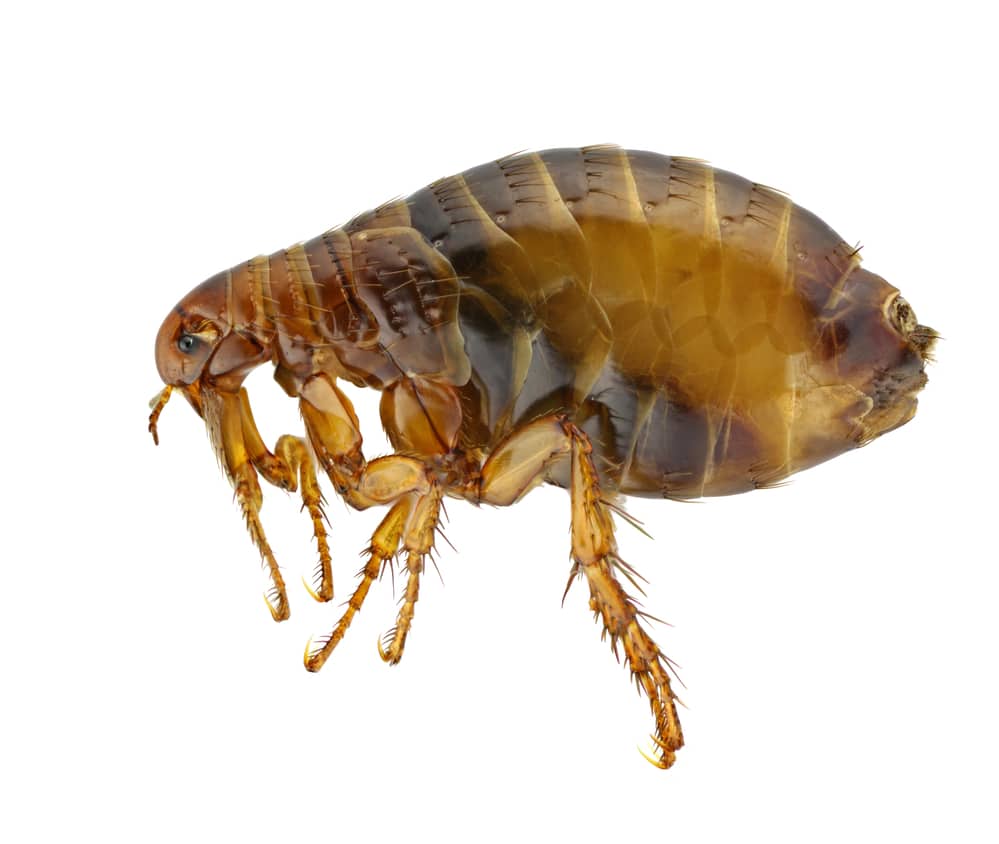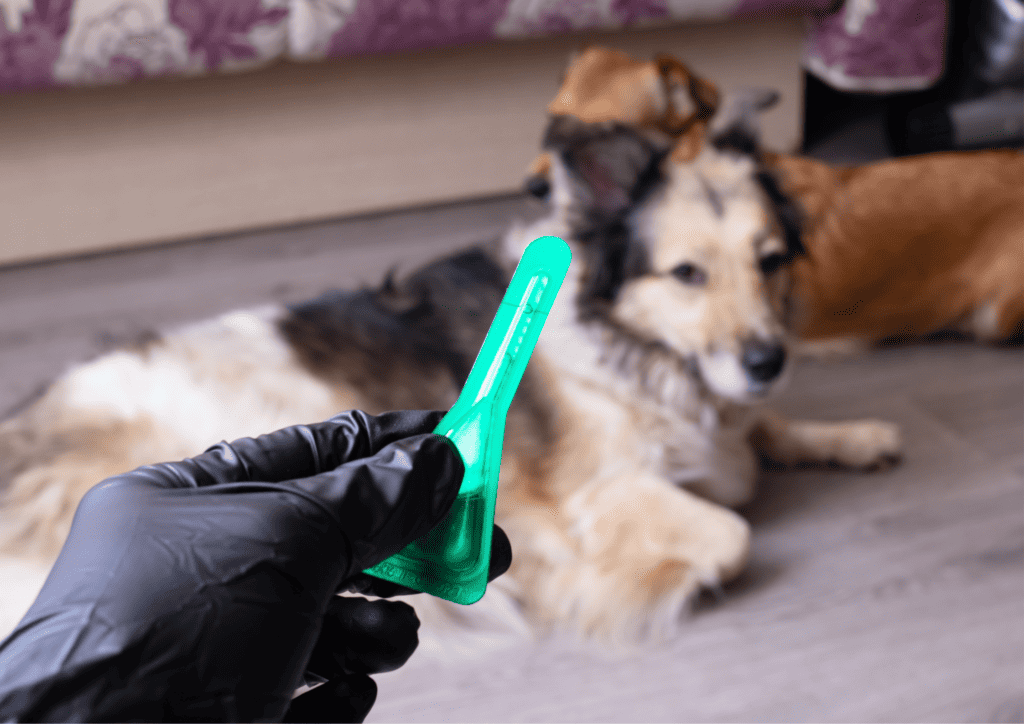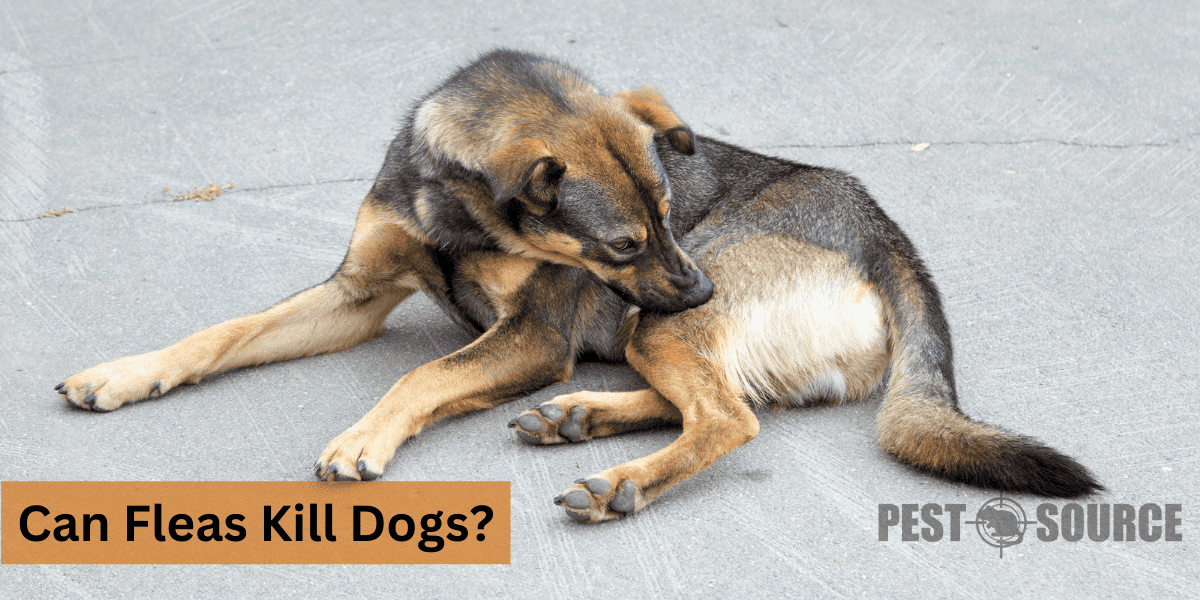Dog owners are often concerned about the threat of fleas to their furry companions. While these pesky parasites are notorious for causing skin irritation and discomfort, many wonder whether fleas can actually kill dogs.
In this article, we’ll explore the dangers of fleas, their impact on dogs, and how to effectively control and prevent infestations. By understanding the significance of fleas and taking appropriate action, you can help keep your dog healthy, comfortable, and safe from potentially life-threatening flea-related complications.
POINTS
- Fleas can potentially kill dogs, primarily through complications such as anemia, severe skin irritation, or the transmission of diseases, making effective prevention and treatment crucial.
- Puppies and all dog breeds, including Yorkies, are susceptible to flea infestations, with the level of infestation depending on factors like living environment and overall health.
- Cats and humans can also be affected by fleas, with cats experiencing similar risks as dogs while humans can suffer from irritation and, in rare cases, disease transmission.
- To effectively treat and prevent flea infestations in dogs, a multi-faceted approach is necessary, including using flea preventatives, grooming, cleaning the home, and treating the yard.
- It’s important to consult a veterinarian for guidance on flea treatment options, particularly in cases of severe or persistent infestations, and maintain a consistent prevention routine to protect your dog.
The Danger of Fleas to Dogs: A Critical Exploration
Can fleas really kill dogs?

Yes, fleas can potentially kill dogs, although it is rare. A severe flea infestation can lead to anemia, severe skin irritation, or the transmission of dangerous diseases, which can be fatal if left untreated. This makes it extremely important for dog owners to understand the risks of fleas and take preventative measures to protect their furry companions.
Why is the topic of fleas significant for dog owners?
Fleas are a common problem for dog owners, and they pose a threat to the health and well-being of their pets. It’s crucial for dog owners to recognize the signs and symptoms of flea infestations, and know how to effectively treat and prevent them. This will not only ensure the comfort of their dogs, but also help prevent potentially life-threatening complications.
Understanding Fleas and Their Threat to Dogs
What are fleas?

Fleas are small, wingless insects that feed on the blood of mammals and birds. They are external parasites, meaning they live on the outside of their host’s body. Fleas have flat bodies and strong legs, enabling them to jump great distances relative to their size. This makes it easy for them to hop onto a passing host, such as a dog, and begin feeding.
What harm can fleas do to dogs?
Fleas pose a variety of health risks to dogs, ranging from minor irritations to potentially life-threatening conditions. Understanding these risks is essential for pet owners to effectively protect their furry friends.
| Health Issue | Description | Symptoms | Potential Outcomes |
|---|---|---|---|
| Skin irritation and itching | Fleas feeding on a dog’s blood can cause allergic reactions, leading to severe itching and discomfort. | Excessive scratching, biting, or licking; red, irritated skin. | Can result in hair loss, skin infections. |
| Anemia | A heavy flea infestation can consume a significant amount of a dog’s blood, leading to anemia. | Pale gums, lethargy, weakness. | Life-threatening if not treated promptly. |
| Disease Transmission | Fleas can transmit diseases and parasites such as Bartonella, mycoplasma, and tapeworms. | Varies by disease; can include fever, swelling at the bite site, fatigue. | Can lead to serious health issues depending on the disease transmitted. |
Why are fleas bad for dogs?
Fleas are bad for dogs because of the numerous health problems they can cause, including skin irritation, anemia, and the transmission of diseases and parasites. These health issues can be uncomfortable, painful, and potentially life-threatening for dogs.
Can fleas make a dog sick?
Yes, fleas can make a dog sick. In addition to causing skin irritation and anemia, fleas can transmit a variety of diseases, including Bartonella (also known as cat scratch disease), mycoplasma, and even the bubonic plague. Additionally, fleas can transmit tapeworms to dogs, which can lead to digestive problems and weight loss.
Severity and Symptoms of Flea Infestations in Dogs
How many fleas can live on a dog?
The number of fleas living on a dog can vary greatly, depending on factors such as the dog’s size, health, and living environment. In general, a dog can host anywhere from a few fleas to hundreds or even thousands.
What does a dog infested with fleas look like?
A dog infested with fleas may display some or all of the following symptoms:
| Symptom | Severity | Recommended Action |
|---|---|---|
| Excessive scratching, biting, or licking | Mild to Severe | Consult vet for appropriate flea treatment. |
| Red, irritated skin | Mild to Moderate | Apply topical treatments; improve grooming routine. |
| Hair loss, particularly near the tail, groin, or underbelly | Moderate to Severe | Seek veterinary advice; may require medicated shampoos. |
| Small, pepper-like specks (flea dirt) on the dog’s skin, bedding, or furniture | Mild to Moderate | Clean home and bedding thoroughly; use flea prevention products. |
| Pale gums, indicating anemia | Severe | Immediate veterinary consultation required. |
| Restlessness or agitation | Mild to Moderate | Ensure a calm environment; consult vet for flea control options. |
What are the symptoms of a dog dying from fleas?
If a dog’s flea infestation is severe and left untreated, it may result in life-threatening complications. Some symptoms indicating that a dog might be at risk of dying from fleas include:
- Weakness and lethargy
- Pale gums and tongue, indicating anemia
- Rapid breathing or panting
- Rapid heart rate
- Weight loss
- Persistent scratching and irritation, despite treatment attempts
- Presence of fleas even after treatment
Why does my dog have so many fleas?
Several factors can contribute to a dog having a severe flea infestation, including:
- Lack of proper flea prevention measures
- Frequent exposure to flea-infested environments
- An underlying health issue that weakens the dog’s immune system, making them more susceptible to infestations
- The presence of other animals in the household that serve as hosts for fleas
Flea Infestations: Puppies and Specific Breeds
Can fleas kill a puppy?

Yes, fleas can potentially kill a puppy. Puppies are particularly vulnerable to flea infestations due to their small size, lack of a fully developed immune system, and thinner skin. A severe flea infestation in a puppy can result in anemia, which can be life-threatening if left untreated.
Are there differences in flea infestations between short-haired and long-haired dogs?
Differences in flea infestations between short-haired and long-haired dogs include:
- Grooming Challenges: Long-haired dogs may find it more difficult to groom themselves and remove fleas compared to short-haired dogs.
- Flea Hiding and Breeding: The dense fur of long-haired dogs provides an easier environment for fleas to hide and breed.
- Detection Difficulty: The thick hair of long-haired dogs can make it harder for owners to notice fleas and flea dirt.
Can specific breeds, like Yorkies, get fleas?

All dog breeds, including Yorkies, can get fleas. The susceptibility to flea infestations does not depend on the dog’s breed but rather on factors such as the dog’s living environment, grooming habits, and overall health.
Flea Infestations in Other Pets and Humans
Can my cat die from fleas?
Yes, like dogs, cats can also suffer life-threatening complications from severe flea infestations, particularly anemia. It is vital for cat owners to ensure their pets are properly protected from fleas to prevent health issues.
Can fleas hurt cats?
Fleas can hurt cats in the same ways they hurt dogs, including causing skin irritation, anemia, and transmitting diseases and parasites. As with dogs, proper flea prevention and treatment are crucial for keeping your cat healthy.
Can fleas kill humans?
Fleas generally do not directly kill humans. However, fleas can transmit diseases to humans, such as the bubonic plague and typhus, which can be life-threatening if left untreated.
Can fleas hurt humans?
Fleas can cause discomfort and irritation for humans, as their bites can lead to itchiness, redness, and sometimes an allergic reaction. Additionally, fleas can transmit diseases to humans, though the risk is relatively low in most modern settings.
Treatment and Prevention of Flea Infestations in Dogs

How to kill dog fleas?
Effective flea treatment involves a variety of methods, each with its specific application and benefits. Understanding these options can help dog owners select the most appropriate treatment to protect their pets from fleas.
| Treatment Method | Effectiveness | Duration | Suitability for Dog Sizes/Ages |
|---|---|---|---|
| Topical flea treatments | High | 1 month | Suitable for all sizes; check age restrictions |
| Oral flea medications | High | 1 month | Suitable for all sizes; check age recommendations |
| Flea shampoos | Moderate | Immediate relief; short-term | Suitable for all sizes; use as per need |
| Flea combs | Moderate | Immediate removal | Suitable for all sizes; regular use recommended |
How can I get rid of fleas on my dog?
To get rid of fleas on your dog, you should:
- Treat your dog with a flea-killing product, as mentioned in the previous section.
- Thoroughly clean your home, including washing your dog’s bedding, vacuuming carpets and furniture, and disposing of the vacuum contents in a sealed bag.
- Treat your yard with a flea-killing spray or granules, focusing on shady areas where fleas are more likely to breed.
- Continue to use a flea preventative on your dog to prevent future infestations.
What are the best ways to get rid of fleas on my dog?
The best and most effective way to get rid of fleas on your dog is to combine multiple methods that involves both direct treatments on your dog and environmental management. Here’s a detailed plan:
- Topical Flea Treatments: Apply a vet-recommended flea preventative like Frontline or Advantage to your dog’s skin every month. These treatments are designed to kill adult fleas and disrupt their life cycle, preventing new infestations.
- Oral Flea Medications: Consider giving your dog oral flea treatments, such as Comfortis or NexGard. These pills can quickly kill fleas and are an easy-to-administer option for dogs that resist topical applications.
- Flea Shampoos: Bathing your dog with a flea-killing shampoo can provide immediate relief by killing the fleas that are currently on your pet. Make sure to follow the instructions carefully for the best results.
- Flea Combs: Use a flea comb on your dog’s coat regularly to physically remove fleas, larvae, and eggs. This can also help monitor the level of infestation.
- Clean Your Home: Vacuum your home frequently, focusing on areas where your dog spends the most time. After vacuuming, dispose of the vacuum bag or empty the canister outside to prevent fleas from escaping back into your home.
- Wash Bedding: Regularly wash your dog’s bedding, as well as any other fabrics they come into contact with, in hot water to kill any fleas or eggs that may be present.
- Treat Your Yard: Fleas can also thrive in your yard, so it’s important to treat outdoor areas. Consider using natural deterrents or seek professional pest control services to target fleas outside.
By combining these strategies, you can effectively combat a flea infestation on your dog and in your environment, ensuring your furry friend stays comfortable and pest-free.
Are there best practices for treating fleas in specific climates, like Florida?
In warmer, humid climates like Florida, fleas can thrive and breed year-round. This makes it even more critical for dog owners in these areas to maintain a consistent flea prevention routine. It’s important to use monthly flea preventatives on your dog, regularly groom them with a flea comb, and treat your home and yard to reduce the risk of flea infestations.
Can dogs get fleas in winter?
Yes, dogs can still get fleas in the winter, although their activity and reproduction may be reduced in colder temperatures. Continuation of your flea prevention routine throughout the winter is essential for maintaining your dog’s health.
Dealing with Severe or Persistent Flea Infestations
My dog is infested with fleas, what do I do?
If your dog has a severe flea infestation, follow these steps:
- Consult your veterinarian for advice on the best flea treatment for your dog.
- Begin flea treatment on your dog according to your veterinarian’s recommendations.
- Thoroughly clean your home and treat your yard to eliminate fleas and their eggs.
- Continue to use a flea preventative on your dog to prevent future infestations.
My dog’s fleas won’t go away, what can I do?
If your dog’s fleas seem persistent:
- Consult your veterinarian to determine if a different flea treatment product or method may be more effective for your dog.
- Be diligent and consistent in treating your home and yard, as fleas and their eggs can hide in various places.
- Consider seeking professional help from a pest control expert to eliminate the flea infestation in your home and yard.
How to treat severe flea infestation on dogs?
For severe flea infestations, it’s crucial to consult your veterinarian for guidance on the best treatment options. In addition to using a strong flea treatment product prescribed by your veterinarian, ensure that you’re thoroughly cleaning your home and treating your yard to eradicate fleas and their eggs.
Conclusion
Can fleas kill a dog: Dispelling myths and summarizing facts
While it is relatively rare, fleas can potentially kill dogs, mainly through complications such as anemia, severe skin irritation, or the transmission of diseases. It’s essential for dog owners to effectively treat and prevent flea infestations to ensure their pet’s health and well-being.
Importance of flea prevention and treatment in maintaining dog health
Proper flea prevention and treatment are crucial in maintaining your dog’s health. By understanding the risks fleas pose and taking appropriate action to control and prevent infestations, dog owners can help protect their pets, keep them comfortable, and prevent potentially life-threatening complications associated with fleas.



